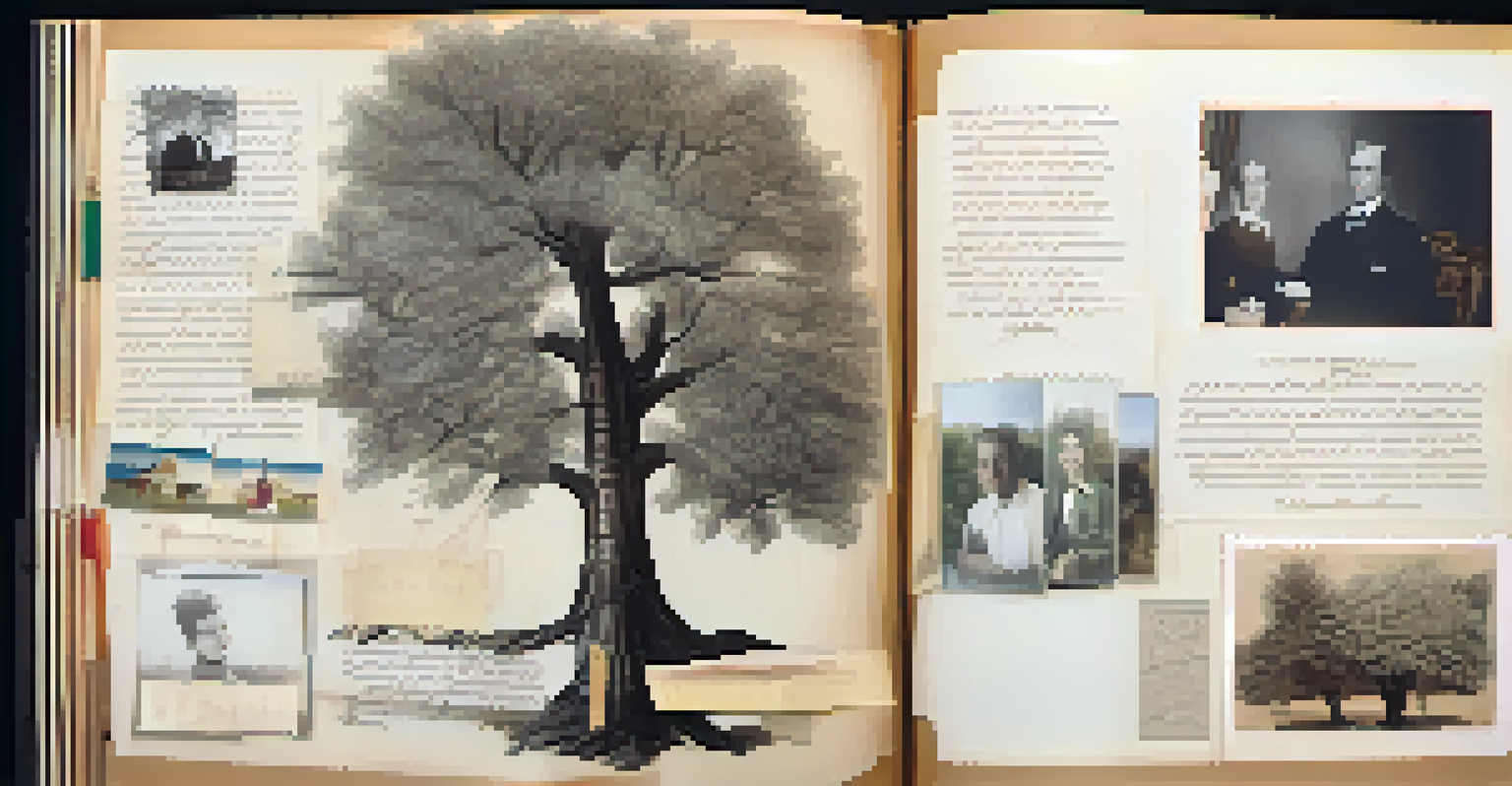Local Archives: A Treasure Trove for Family History Research

What Are Local Archives and Why They Matter
Local archives are repositories that hold historical documents, records, and collections specific to a geographic area. They are often housed within libraries, historical societies, or government buildings. Understanding their significance can unlock a world of information for family history research.
In seeking truth, you have to get both sides of a story.
These archives are treasure troves of data, from birth and marriage records to census information and land deeds. By exploring local archives, you can piece together the stories of your ancestors and gain insights into their lives and times. It’s like finding a key that opens a door to your family's past.
Moreover, local archives often contain unique materials that you won’t find in online databases, such as personal letters, photographs, and diaries. These items can provide a personal touch to your family history, helping you to connect with your lineage on a deeper level.
How to Locate Your Local Archives
Finding your local archives might be easier than you think. Start by searching online for your city or county’s historical society or library website. Many institutions provide information about their collections, hours of operation, and any special events or workshops they may offer.

You can also reach out to local genealogy groups or forums for recommendations. Fellow researchers can be a wealth of knowledge and may point you toward lesser-known archives or resources. Networking with others interested in family history can lead to unexpected discoveries.
Local Archives Hold Family Treasures
Local archives are invaluable resources for discovering personal histories through unique documents and records.
Don’t forget to consider local universities and colleges, as they may house archives or special collections that pertain to the region. These institutions often have dedicated staff who can assist you in navigating their collections.
Types of Records Found in Local Archives
Local archives typically house a wide array of records that are invaluable for family history research. Common records include birth, marriage, and death certificates, which can provide essential dates and family connections. These documents are often the backbone of genealogical research, linking generations together.
History is not a burden on the memory but an illumination of the soul.
In addition to vital records, you may find land records, wills, and court documents that reveal how your ancestors lived and the decisions they made. These records can paint a vivid picture of their social and economic status, as well as their interactions within the community.
Local newspapers are another gem often found in archives, offering insights into everyday life, events, and even obituaries. By combing through these resources, you can uncover stories that bring your family history to life, making it more than just a list of names and dates.
Navigating the Archive: Tips for Researchers
When you visit a local archive, it’s essential to have a plan to make the most of your time. Before you go, create a list of specific records or information you want to find. This will help you stay focused and efficient during your visit.
Don’t hesitate to ask for help from the archivists or staff members. They are often passionate about history and can provide valuable insights or direct you to resources you might not have considered. A simple question can lead to significant discoveries.
Engage with Community Resources
Collaborating with local genealogy clubs and online forums can significantly enhance your family history research experience.
Lastly, be prepared for the possibility of finding unexpected information. Sometimes, the most intriguing stories come from records or materials you didn’t initially seek. Keep an open mind and be ready to explore the connections that may arise.
Preserving Your Findings for Future Generations
Once you've gathered your family history research, it’s essential to preserve your findings for future generations. Consider creating a family tree or a scrapbook that incorporates the documents, photographs, and stories you've uncovered. This not only keeps the information organized but makes it accessible and engaging for your relatives.
Digital preservation is another option worth exploring. Scanning documents and photos ensures they are safely stored and can be shared easily with family members. Plus, it protects them from physical degradation over time.
Finally, consider sharing your discoveries with younger family members. Hosting a family gathering where you present your findings can spark interest in genealogy among the next generation, ensuring that your family history continues to be cherished and explored.
The Emotional Impact of Family History Research
Diving into family history research can evoke a range of emotions, from joy to sadness. Discovering stories about your ancestors can create a sense of connection and belonging, helping you understand where you come from. It’s like piecing together a puzzle that reveals the larger picture of your identity.
On the other hand, you might uncover stories that are difficult to process, such as struggles or tragedies faced by your ancestors. Acknowledging these aspects of your family history is crucial, as it can lead to a deeper appreciation for their resilience and sacrifices.
Preserve Findings for Future Generations
It's crucial to organize and share your family history discoveries to ensure they remain accessible for future family members.
Ultimately, the emotional journey of researching your family history enriches your understanding of not only your ancestors but also yourself. It reminds us that we are part of a larger narrative, woven together through the experiences of those who came before us.
Community Resources: Collaborating with Others
Collaborating with others can enhance your family history research significantly. Many communities host genealogy clubs or workshops that allow you to share findings, exchange tips, and provide support. These gatherings can lead to friendships and connections that enrich your research journey.
Local archives often host events, such as lectures or open houses, where you can learn from experts and meet fellow enthusiasts. Engaging with these resources not only expands your knowledge but may also introduce you to individuals who share similar ancestral backgrounds.

Additionally, online forums and social media groups dedicated to genealogy can provide a broader support network. You can ask questions, seek advice, and even discover distant relatives who are also researching the same family lines. The power of community can propel your research forward in exciting ways.